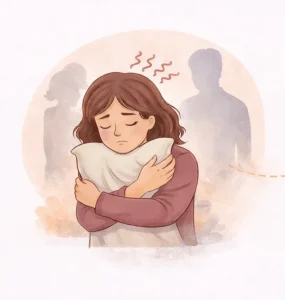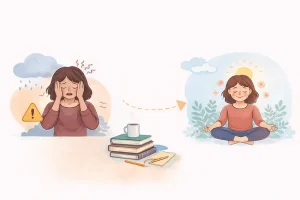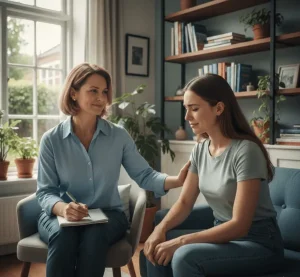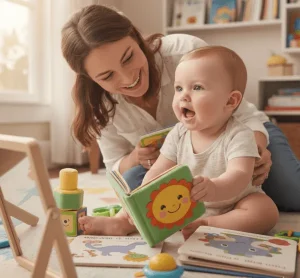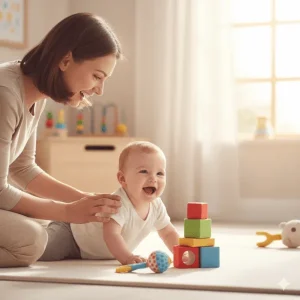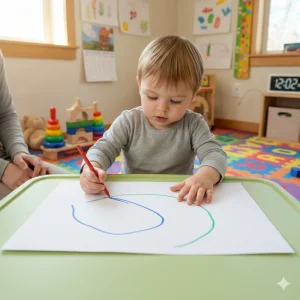Why BASICS is the Best Speech Therapy App for Home Use
By Wellness Hub
Last Updated: October 24, 2025
Parents today are searching for the best speech therapy app for home use—something that goes beyond flashcards or videos and actually helps children speak, understand, and communicate. That’s where the BASICS App, created by speech and occupational therapists, makes a difference. Designed for children aged 2 to 8, BASICS transforms everyday screen time into guided speech and language therapy practice through play.
Unlike generic learning apps, BASICS follows a goal-based learning system that adapts to your child’s developmental stage—from first words and articulation to sentences, WH questions, and social communication. Each activity is interactive, visual, and evidence-based, helping children learn naturally while keeping parents actively involved.
If you’re looking for a therapist-designed speech therapy app that supports speech delay, autism, or early language development right from your home, BASICS offers a structured, motivating way to make progress—one word, one game, and one smile at a time.
Understanding the Need for Speech Therapy at Home
Speech therapy at home is becoming one of the most effective ways to help children develop communication skills early. For parents of toddlers and preschoolers, consistent practice outside therapy sessions is key to progress. A speech therapy app for home use like BASICS bridges that gap by turning daily routines into structured, engaging language learning experiences.
Home-based therapy allows children to practice in a comfortable environment, without pressure or overstimulation. Parents get to observe their child’s responses, reinforce progress, and turn every moment—mealtime, playtime, or bedtime—into an opportunity for speech and language growth.
By combining therapist-designed activities with guided repetition, BASICS ensures that children not only imitate words but also understand, use, and apply them in real-life settings.
Why Home-Based Speech Practice Matters for Children Aged 2–8
Early childhood (ages 2–8) is the most critical window for speech and language development. During this time, a child’s brain rapidly forms connections related to listening, vocabulary, and communication. Consistent speech practice at home ensures these skills are reinforced daily, not just during weekly therapy sessions.
At-home speech therapy builds:
- Routine and familiarity: Kids learn faster when speech practice feels like play rather than a test.
- Parent involvement: Research shows that parent participation significantly improves communication outcomes.
- Confidence and comfort: Children are more relaxed and willing to attempt new sounds and words in a familiar setting.
With BASICS, parents can follow a structured home speech therapy plan developed by experts, ensuring each practice session aligns with professional strategies for articulation, vocabulary, and comprehension.
Challenges Parents Face Without Guided Tools
Many parents want to help their child improve speech but struggle to know how. Without structured guidance, practice can feel random or repetitive. Common challenges include:
- Not knowing what to teach next: Without a plan, parents often repeat the same words, slowing progress.
- Limited engagement: Kids quickly lose interest in paper worksheets or unstructured drills.
- Lack of feedback: Parents can’t easily track improvement or identify where a child is getting stuck.
- Over-reliance on screen videos: Passive watching doesn’t build speech—it needs active participation.
That’s why using a speech therapy application like BASICS helps. The app provides step-by-step progression, clear speech goals, and visual feedback, making home sessions more effective and enjoyable.
How Digital Platforms Make Early Intervention Easier
Technology has revolutionized early intervention. Digital speech therapy platforms like BASICS make it possible for families to practice anytime, anywhere—without waiting for weekly therapy appointments.
Here’s how:
- Accessibility: Parents can access professional-quality speech exercises from home.
- Consistency: Regular short sessions build better results than infrequent clinic visits.
- Gamified learning: Children stay motivated through interactive games, visuals, and rewards.
- Personalization: Each activity adapts to your child’s age, speech goals, and level of progress.
For children with speech delay, autism, or articulation difficulties, early and consistent practice through apps like BASICS ensures that intervention begins as soon as possible—right when the brain is most ready to learn.
What Makes a Good Speech Therapy App?
Parents often search for “best speech therapy apps for kids” or “speech therapy at home tools”, but not all apps are created equal. The right app should do more than entertain — it should build real communication, language, and thinking skills in a structured, therapist-approved way. Here’s what truly defines a high-quality speech therapy app for home use.
Key Qualities to Look For — Structure, Motivation, Therapist Input
A strong speech and language therapy app starts with structure. Children learn best when their activities follow a logical, step-by-step path — from identifying sounds to forming words and sentences. Apps like BASICS use goal-based progression, where every level focuses on specific developmental milestones such as vocabulary, articulation, or comprehension.
Equally important is motivation. The best speech therapy apps for kids combine fun with learning — using visuals, voice prompts, and instant rewards to keep children engaged. A motivating app celebrates small wins, encouraging consistency and daily practice without feeling like “homework.”
And finally, therapist input is crucial. Apps designed or reviewed by speech-language pathologists (SLPs) ensure that each activity targets real communication goals — like imitation, attention, and sentence formation — instead of random games. Therapist-guided design means parents can trust the process and track genuine progress over time.
Balancing Screen Time with Developmental Value
In today’s digital world, screen time is inevitable — but not all screen time is equal. The key is to ensure quality over quantity. A good speech therapy app for toddlers or preschoolers transforms screen time into meaningful learning by combining interaction, engagement, and movement.
Apps like BASICS encourage children to tap, listen, and respond — activating both attention and language centers of the brain. Short, structured sessions of 10–15 minutes help children learn words, understand questions, and practice pronunciation while keeping their focus sharp.
Parents can easily balance screen use by integrating short app sessions into daily routines — for example, a quick vocabulary game before bedtime or after school. This makes learning natural, positive, and developmentally valuable.
Why Parent-Guided Apps Outperform Passive Video Tools
Many parents try YouTube videos or general language apps, but passive watching doesn’t teach active communication. Children may recognize words, but they don’t practice responding, naming, or thinking independently.
Parent-guided speech therapy apps, on the other hand, invite interaction. Instead of watching, children do — tapping pictures, answering WH-questions, matching sounds, or identifying emotions. Apps like BASICS also guide parents on what to say or how to prompt responses, turning each moment into a shared learning experience.
This interactive, play-based approach strengthens attention, imitation, and expressive language. Over time, kids not only improve speech clarity but also learn to use words meaningfully — during play, routines, and social interactions.
In summary:
A truly effective speech therapy app for home use blends structure, therapist expertise, and parent interaction — turning screen time into a powerful language-building opportunity.
Inside BASICS App — A Therapist-Designed Approach
Parents often wonder what makes the BASICS App different from other speech therapy apps for kids. The answer lies in its foundation — it’s built by expert speech therapists, occupational therapists, and behavioral specialists who understand how children learn best. Every game, sound, and visual prompt inside BASICS is purposefully created to help children build speech, language, and communication skills in a structured yet playful way.
Unlike generic learning apps, BASICS combines clinical expertise with child-friendly design, ensuring that every activity supports natural speech development — from first sounds to full conversations.
Developed by Expert Speech Therapists
The BASICS App was designed by a multidisciplinary team of licensed speech-language pathologists (SLPs) and child-development professionals. These experts have worked with hundreds of children facing speech delay, autism, and communication challenges, translating real therapy goals into interactive, screen-based learning.
Each activity in BASICS aligns with speech therapy best practices— helping children develop:
- Receptive language skills (understanding words and instructions)
- Expressive language skills (speaking, naming, and describing)
- Articulation and sound clarity
- Social communication such as eye contact and turn-taking
The app functions like a virtual home speech therapist, guiding parents step-by-step to reinforce therapy goals between sessions. This makes BASICS ideal for home-based speech therapy or for families without regular access to a professional SLP.
Age-Appropriate Goals — From First Words to Full Sentences
BASICS follows a developmental progression that mirrors the natural way children acquire speech. The app’s learning pathway includes age-specific goals designed to match your child’s current communication stage — whether they’re naming their first words, forming two-word phrases, or building complete sentences.
- Ages 2–3: Early learning through matching, naming familiar objects, and simple yes/no questions
- Ages 3–4: Vocabulary expansion with animals, foods, toys, and action words
- Ages 4–5: Sentence building using “he,” “she,” and action phrases (“The boy is running”)
- Ages 5–6: Complex sentence structures, grammar, and storytelling through play
Each goal is measurable, motivating, and adaptable — allowing parents to see steady progress through the Goal Mode dashboard. By following these structured stages, BASICS ensures that children develop speech and language milestones at their own pace, supported by repetition and play.
Evidence-Based Methods — Video Modeling, Visual Prompts, and Repetitions
BASICS uses evidence-based therapy methods proven to improve speech and communication outcomes in young children. These include:
- Video Modeling: Children watch short, engaging clips of peers performing actions or speaking, which helps them imitate sounds, gestures, and words naturally. This technique is widely used in autism therapy and early intervention.
- Visual Prompts: Every activity features bright, realistic visuals that help kids connect objects, actions, and words. Visuals reduce cognitive load, making it easier for children — especially visual learners — to understand and respond correctly.
- Repetition and Reinforcement: BASICS App follows the principle of consistent repetition, which strengthens memory and articulation. Each correct response triggers positive reinforcement — sound effects, stars, and smiles — motivating children to keep practicing.
By integrating these scientifically backed strategies into its design, BASICS ensures that learning stays interactive, multisensory, and clinically effective— not just entertaining.
Play-Based Learning That Builds Real Communication
How BASICS Turns Daily Play Into Language Practice
Speech therapy doesn’t have to feel like a lesson — and that’s exactly where BASICS App stands out. It transforms everyday play into meaningful speech and language practice through visuals, sounds, and interactive storytelling.
Each game inside BASICS is built around the way young children naturally learn — by observing, imitating, and engaging with what they see. Instead of drills or flashcards, your child learns through play-based repetition that keeps them motivated. When a child taps, listens, and responds to on-screen cues, they’re not just playing — they’re strengthening attention, comprehension, and expressive language.
This approach makes speech therapy at home enjoyable and stress-free. Parents can join in, guiding their child’s play while the app models clear sounds, gestures, and words. These shared moments help children associate speech with fun, connection, and success — the foundation for confident communication.
Interactive Activities — Matching, Naming, WH-Questions, Conversation Cards
BASICS offers a structured yet engaging path through interactive activities that gradually build your child’s speech, vocabulary, and comprehension skills.
- Matching Games in Foundation Forest help children identify and connect similar pictures or sounds, improving attention to detail and memory.
- Naming and Labeling Tasks in Word Wonders and Vocabulary Valley encourage children to say what they see — from animals and foods to colors and actions — helping them move from understanding words to using them spontaneously.
- WH-Question Activities in Inquiry Island teach children to respond to “What,” “Where,” and “Who” questions through vivid visuals and context-based cues, supporting receptive and expressive language.
- Conversation Cards in Conversation Circles introduce real-life communication practice — greetings, emotions, daily routines, and simple choices — helping children learn turn-taking and natural dialogue.
Each of these experiences builds not just vocabulary, but meaningful speech, helping children connect language to everyday life.
Keywords: interactive speech therapy games, naming activities for kids, WH questions for toddlers, conversation cards for language practice, early speech and communication app
Encouraging Imitation, Turn-Taking, and Joint Attention
The heart of communication development lies in three skills — imitation, turn-taking, and joint attention — and BASICS integrates all three into its design.
- Imitation: Children watch short visual models and then repeat the action, sound, or word. This supports speech sound production and motor planning, crucial for kids with speech delay or autism.
- Turn-Taking: Games like Yes/No, Conversation Circles, and Action Words encourage back-and-forth responses, teaching the rhythm of conversation and improving social reciprocity.
- Joint Attention: Through bright visuals, animations, and parent-guided prompts, BASICS helps children focus on the same object or action — a key milestone in social communication development.
By combining structured visuals with playful engagement, BASICS helps children listen, respond, and share attention naturally. These early skills form the building blocks for long-term language growth, emotional connection, and social understanding.
How BASICS App Fits Into Your Daily Routine
Goal Mode — Structured Sessions With Progress Tracking
Consistency is the foundation of speech progress—and Goal Mode in the BASICS App is designed to make that simple for parents. Instead of wondering what to practice each day, BASICS provides a therapist-structured pathway that adapts to your child’s developmental level.
Each goal in the app—such as Early Learning Skills, Core Language, or WH Questions—includes interactive, step-by-step activities carefully organized to match your child’s ability and attention span. Parents can start a session, let their child explore, and watch progress unfold in real time.
With visual progress bars, badges, and reports, parents can easily track how many activities are completed and which skills are strengthening—like vocabulary, articulation, or comprehension. This structure helps you maintain a daily speech therapy routine at home, ensuring every minute contributes to real progress.
Library Mode — Flexible Practice by Topic or Skill
Every child learns differently, and Library Mode gives parents the flexibility to choose what matters most that day. Whether your child loves animals, needs practice with colors, or struggles with WH questions, you can pick the exact topic or skill to focus on—no setup or planning required.
Library Mode works like a personalized speech and language toolkit, filled with hundreds of visuals, sounds, and real-life objects. You can use it to reinforce what a therapist taught, or to help your child generalize words and sentences into daily life.
Because activities are short, interactive, and visually engaging, kids stay motivated while learning to listen, name, repeat, and understand. This open-access mode gives families total control over home-based speech therapy, turning the app into an extension of your parenting routine.
10–15 Minutes a Day: Making Consistency Simple for Parents
Speech progress doesn’t require long hours—it thrives on short, consistent practice. BASICS is designed for busy families, letting you fit therapy into your schedule in just 10–15 minutes a day.
Because activities are playful and goal-based, children engage willingly—during snack time, after school, or before bedtime. Parents don’t need technical knowledge; the app guides each session, balancing fun and learning.
Even brief daily use builds long-term gains in attention, articulation, vocabulary, and comprehension. Over time, these micro-sessions become a natural part of your child’s day—like brushing teeth or reading together—making learning seamless, stress-free, and sustainable.
Benefits Parents Notice Over Time
As parents begin using the BASICS App for speech therapy at home, small changes soon add up to visible progress. Because the program is built on consistent, play-based routines, children gradually show improvement in attention, eye contact, word recall, and overall communication confidence.
Unlike generic language apps, BASICS uses therapist-designed progression and real-time feedback, allowing families to track measurable gains in speech and language skills over time.
Better Attention, Eye Contact, and Word Recall
One of the first benefits parents notice is improved focus and attention span during activities. Each session in BASICS is short, visual, and interactive—ideal for children who struggle to stay engaged in traditional therapy or classroom settings.
As children follow on-screen instructions, tap matching pictures, or repeat modeled words, they naturally practice sustained attention and joint engagement. The app’s visual prompts and reward sounds motivate kids to look, listen, and respond—encouraging consistent eye contact during learning.
Over repeated sessions, children begin to remember familiar images, sounds, and words, showing stronger word recall and vocabulary retention. This combination of visual, auditory, and motor engagement helps the brain connect words with meaning—one of the cornerstones of speech and language development.
Growing Confidence in Everyday Communication
With BASICS, parents often see a transformation in how confidently their children use language in daily life. The app begins with simple naming tasks and gradually builds to phrases and sentences, helping kids practice functional communication—like asking for objects, describing pictures, or expressing feelings.
Because each level reinforces success before introducing new challenges, children gain self-confidence as they complete achievable goals. Over time, they begin to initiate words and sentences outside the app—during meals, playtime, or school activities.
This steady growth supports both expressive and receptive language skills, empowering children to understand instructions, participate in conversations, and express needs more clearly.
Positive Reinforcement and Measurable Progress in the App
BASICS uses a built-in progress-tracking system that celebrates every milestone—no matter how small. Each correct response, completed level, or streak of consistent practice earns encouraging sounds, visuals, and rewards. This positive reinforcement keeps children motivated while helping parents see their child’s improvement clearly.
The app’s Goal Mode automatically tracks mastered skills—such as naming, answering WH questions, or following directions—so families can monitor progress week by week. Parents can view how often their child practiced, which categories they excel in, and where extra support may be needed.
Over time, these insights reveal measurable improvements in speech clarity, vocabulary range, and listening comprehension—providing real-world proof that play-based therapy works.
Comparing BASICS App With Traditional Home Worksheets
When parents think about speech therapy at home, they often turn to printable worksheets or flashcards. While these tools have their place, modern research and therapist feedback show that interactive speech therapy apps like BASICS create far better engagement and language progress.
Here’s a quick comparison of how BASICS differs from traditional methods in promoting speech, language, and communication skills.
Table: BASICS App vs. Traditional Home Worksheets
| Feature | BASICS App (Visual, Auditory, Interactive) | Traditional Worksheets (Paper-Based Practice) |
|---|---|---|
| Learning Style | Multisensory – combines visuals, voice, animation, and touch for active learning | Mostly visual – relies on printed images or written words |
| Engagement Level | High – gamified tasks, sounds, and rewards hold attention | Low to moderate – repetition can lead to boredom |
| Feedback & Motivation | Real-time voice prompts, rewards, and progress tracking | Static – requires parent or therapist feedback manually |
| Therapist Design & Structure | Created by speech, occupational, and behavioral therapists | Usually general or teacher-made, not therapy-specific |
| Adaptability | Automatically adjusts to child’s skill level and responses | Fixed difficulty – one worksheet fits all |
| Focus & Attention | Interactive visuals and short sessions improve focus span | Longer attention demand; limited sensory stimulation |
| Accessibility & Convenience | Portable; practice anywhere using Goal Mode or Library Mode | Requires printing, setup, and adult supervision for each activity |
| Speech Development Areas Covered | Covers articulation, vocabulary, WH questions, and sentence building | Limited to labeling and writing tasks |
| Progress Tracking | Built-in progress reports for parents | Manual tracking or observation required |
| Overall Effectiveness | Consistent improvement in speech clarity and confidence through daily play | Helpful for revision but lacks sustained engagement |
Visual, Auditory, and Interactive vs. Paper-Based Repetition
The BASICS App blends visual, auditory, and tactile learning, allowing children to see, hear, and respond to each speech prompt. This multisensory approach activates multiple parts of the brain — improving attention, memory, and speech clarity.
In contrast, paper worksheets mainly rely on visual repetition. While they can teach recognition, they rarely engage a child’s listening or response systems.
When children tap, hear, and speak through BASICS App, they’re not just memorizing — they’re practicing real communication. Interactive feedback like “Great job!” or “Try again” reinforces correct responses instantly, turning each activity into a mini therapy session that feels like play.
Why Therapist-Guided App Learning Sustains Engagement Longer
Unlike generic apps, BASICS was built by speech and occupational therapists, ensuring that every level aligns with real developmental goals — from matching and articulation to sentence formation and reasoning. Each session adapts to a child’s pace, using a structured reward loop that mimics in-clinic therapy.
In contrast, worksheets follow a one-size-fits-all pattern, requiring constant adult supervision and repetition. As children grow, the lack of novelty and progress tracking often leads to disengagement.
Because BASICS connects therapist-approved content with gamified progress systems, it helps children stay motivated across weeks — not minutes. Parents can view results instantly, reinforcing learning through both play and progress.
Who Can Benefit Most From BASICS App
The BASICS App is designed for every child who needs structured, play-based speech and language support at home. Its therapist-created activities adapt to different learning styles and developmental needs, making it one of the most inclusive speech therapy apps for home use. Whether your child struggles with delayed speech, needs extra language practice, or learns best through visuals, BASICS provides a guided pathway for consistent progress.
Children With Speech Delay or Late Talking
For children experiencing speech delay or late talking, early practice and repetition are essential. The BASICS App offers step-by-step activities—from identifying sounds and naming objects to forming short phrases—that mirror the techniques used by professional therapists.
Through interactive modules like Word Wonders, Phrase Park, and Sentence Symphony, children gradually move from single words to full sentences in a fun, pressure-free environment. Visual cues, voice prompts, and real-life examples help improve pronunciation, comprehension, and word recall.
Parents can easily integrate speech therapy at home into daily routines, making BASICS a practical tool for toddlers and preschoolers who need extra communication support. Each goal is age-appropriate, measurable, and designed to spark confidence in young learners.
Keywords used: speech delay app, late talking solutions, speech therapy for toddlers, home speech therapy activities, communication development at home.
Kids on the Autism Spectrum or With ADHD
Children with autism or ADHD often need more visual structure, repetition, and motivation to stay engaged during learning. BASICS brings all three together through its Goal Mode and visual learning system.
For children on the autism spectrum, the app encourages joint attention, imitation, and expressive communication—skills often targeted in therapy. Levels like Inquiry Island and Emotions Explorer help children answer WH-questions, recognize feelings, and practice social interaction in predictable, game-like formats.
For children with ADHD, the short, reward-based sessions improve focus, attention span, and working memory without overwhelming them. Visual prompts, progress badges, and positive reinforcement keep motivation high.
Because BASICS combines speech, cognition, and behavior support, it becomes a powerful companion to therapy sessions or can be used independently for at-home practice.
Families Seeking Structured Bilingual or Visual Learning Support
In bilingual homes or multilingual environments, children often mix or delay speech across languages. BASICS provides a structured visual learning platform that supports speech development regardless of language background.
The app’s visual-first design, clear voice modeling, and categorized vocabulary (animals, foods, actions, emotions, etc.) help children associate words with images—an approach proven effective in bilingual language learning. Parents can select specific speech therapy activities for kids that reinforce vocabulary and comprehension in both home and school languages.
Visual learners, including children who respond best to pictures and patterns, benefit from BASICS’ interactive visuals and audio pairing, which strengthen memory, comprehension, and expressive speech.
With guided repetition, goal tracking, and adaptable challenges, BASICS app empowers every family to support language growth at home—no matter the child’s learning style or language environment.
Getting Started With BASICS App at Home
Starting speech therapy at home becomes effortless when parents have a clear structure and age-appropriate guidance. The BASICS App simplifies this process with Goal Mode, Library Mode, and built-in progress tracking, allowing families to make consistent progress even without daily therapist sessions. Whether your child is a toddler with speech delay, a preschooler building first words, or a young learner improving pronunciation, BASICS adapts to their developmental stage.
Downloading and Setting Goals Based on Age
To begin, download the BASICS App from the App Store or Google Play and set up your child’s profile. The app automatically suggests goals based on age and skill level, making it easy for parents to know where to start.
- Ages 2–3: Foundation Forest introduces early learning goals like matching, sounds, and first words, perfect for toddlers beginning speech.
- Ages 3–5: Word Wonders and Phrase Park focus on vocabulary, naming objects, and forming short sentences.
- Ages 5–7: Sentence Symphony and Inquiry Island help children answer WH questions, describe actions, and build conversation skills.
Each goal is therapist-designed and follows a clear developmental path—from imitation to communication to sentence formation. Parents can explore Goal Mode to follow structured daily tasks or switch to Library Mode for flexible practice. This ensures the child’s speech therapy plan grows naturally, step by step, based on real progress.
Final Thoughts — Turning Home Time Into Therapy Time
Speech development thrives on structure, repetition, and fun
Speech progress doesn’t happen overnight—it’s built through consistent, structured, and playful practice. When children repeat words, listen to sounds, and interact with visuals regularly, their brains strengthen the pathways for speech, comprehension, and attention. A good speech therapy app for home use creates the perfect mix of fun and focus, helping kids stay engaged while learning to communicate naturally.
BASICS App empowers parents to make every minute meaningful
With the BASICS App, everyday moments become opportunities for growth. Whether your child is naming animals, answering WH questions, or forming short sentences, each activity is therapist-designed to support real communication goals. Parents can track progress, adjust goals, and guide their child’s journey—turning screen time into purposeful learning time.
Start today, and make home the most effective place for your child’s speech and language development.
About Wellness Hub
Wellness Hub is a trusted digital platform that empowers parents, caregivers, and professionals with science-backed tools for childhood development. From online speech therapy to home therapy resources, we offer a holistic ecosystem for children facing speech delays, autism, ADHD, and other developmental challenges.
Rooted in evidence-based practices and delivered by certified experts, Wellness Hub bridges the gap between accessibility and quality care. Whether you need at-home speech strategies, developmental checklists, or interactive mobile apps like BASICS App, we make early intervention affordable and family-friendly.
Start your journey today with expert guidance tailored to your child’s unique communication and learning needs—anytime, anywhere.
Frequently Asked Questions
1. What age group is BASICS App suitable for?
BASICS is designed for children aged 2 to 8 years, covering early developmental milestones—from first words and imitation to full sentences, conversation skills, and early math. The activities grow in complexity as your child progresses through the levels.
2. How is BASICS App different from other speech therapy apps?
Unlike generic learning apps, BASICS is therapist-designed, combining speech, language, cognition, and emotional learning in one structured system. It uses Goal Mode for guided progression and Library Mode for free play, ensuring that every activity builds real communication skills—not just vocabulary recall.
3. Can BASICS be used without a speech therapist?
Yes. BASICS is built so parents can use it independently at home. Its clear visuals, step-by-step levels, and progress tracking help families practice safely between sessions. However, therapists can also integrate BASICS into formal speech therapy programs for faster results.
4. How much screen time is recommended per day?
Most children benefit from 10–20 minutes of guided BASICS play daily. The app focuses on active learning—listening, speaking, tapping, and responding—so screen time remains purposeful and interactive rather than passive.
5. Does BASICS App help non-verbal children or those with autism?
Yes. BASICS includes video modeling, imitation prompts, and visual routines proven effective for non-verbal and autistic learners. It supports joint attention, imitation, and early communication, helping children move from gestures to meaningful words.
6. What speech areas does BASICS App focus on?
BASICS covers articulation, vocabulary, sentence building, comprehension (WH-questions), and conversational turn-taking. It also strengthens attention, memory, and pre-literacy—making it a holistic communication tool for early learners.
7. Is BASICS App suitable for bilingual or multilingual families?
Yes. BASICS emphasizes visual learning, making it suitable for bilingual households where parents may use more than one language. The clear images and structured prompts help children associate concepts and sounds across languages.
8. Can BASICS App track my child’s progress?
Absolutely. BASICS includes in-app progress tracking that shows how many goals, words, and activities your child completes. Parents can see improvement trends, helping them stay consistent with practice and celebrate milestones.
9. How much does BASICS App cost to use?
BASICS offers a free trial with access to core levels, and parents can later unlock full access through affordable subscription plans. It’s designed to make high-quality, therapist-led learning accessible to every family. (Avoid specific pricing for schema — informational focus only.)
10. Can BASICS App replace in-person speech therapy?
BASICS complements—but doesn’t replace—professional speech therapy. It’s ideal for home practice between sessions, early screening, or when therapy access is limited. Used consistently, it reinforces what children learn in therapy and accelerates progress.
Book your Free Consultation Today
Parent/Caregiver Info:
Client’s Details:
* Error Message


